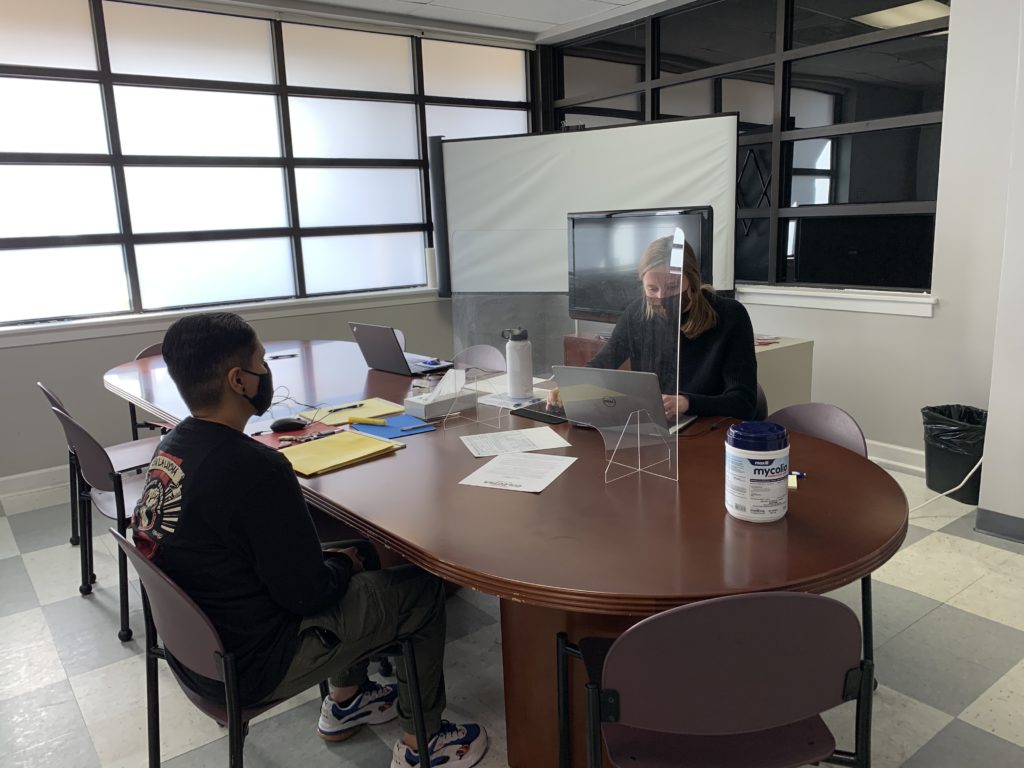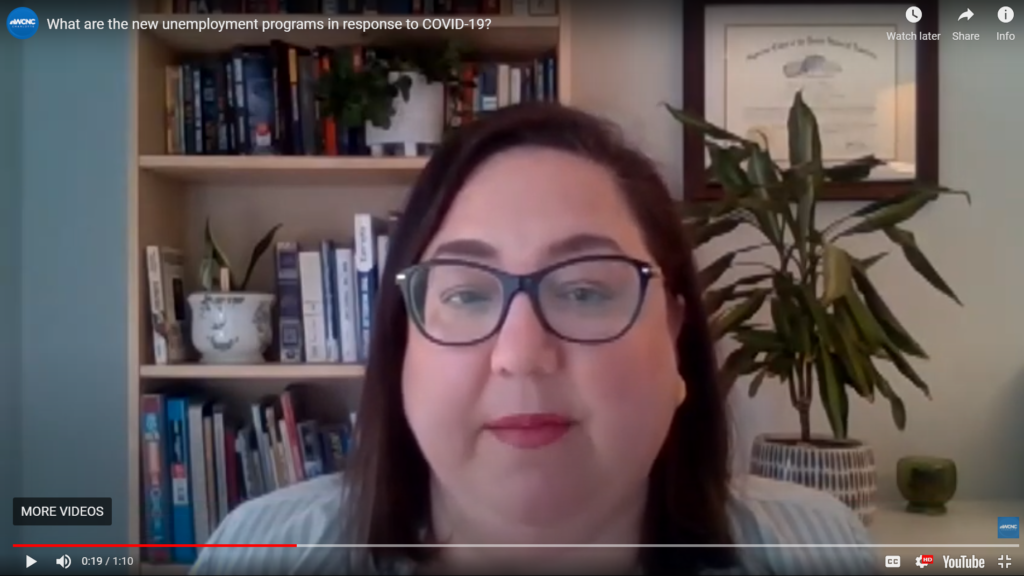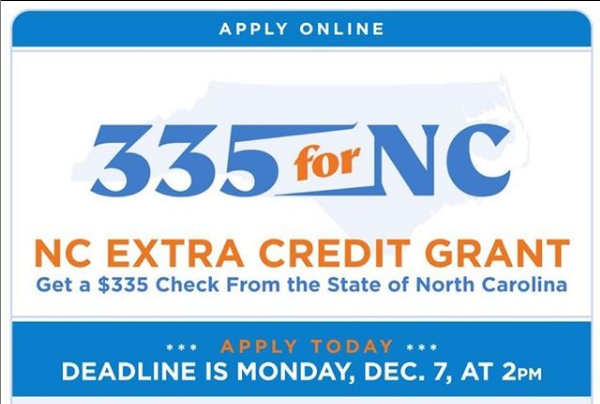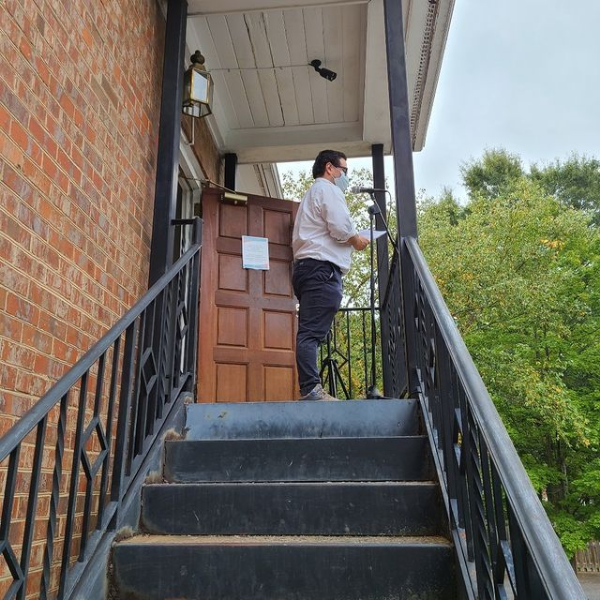Last March, few imagined that our community would still be grappling with the coronavirus pandemic a year later.
In many ways it seems the pandemic is nearing an end after this year of hardship and loss: vaccines for the virus are increasingly available, and cases have dropped to a point where North Carolina is easing activity restrictions.
But we are only just beginning to understand the extent to which this virus has driven our neighbors to the margins of safety, economic security and family stability, laying bare the extreme inequities that have long existed in our community.
Charlotte Center for Legal Advocacy has spent the last year fighting for our community’s most vulnerable residents as COVID-19 upended daily life.
As we pass this milestone, we take stock of just how much we’ve fought to advance our mission of pursuing justice this past year.
It’s work we do every day and have always done in our 50+ years of service. But COVID-19 has cast a glaring spotlight on the importance of our mission.
Pursuing justice: It’s fairness under the law. It’s equal access. It’s meeting basic needs. And it’s making sure our neighbors are equipped to endure any crisis life throws their way, including a global pandemic.
Today and every day, we continue this hard, necessary work until our community is a stronger, more just and equitable place for ALL.
Over the past year we:
- Addressed immediate issues related to agency closures in our local Department of Social Services (DSS), allowing for remote application for benefits and limiting terminations and state unemployment insurance systems to tackle issues stalling federal unemployment benefits.
- Helped clients navigate individual economic stimulus payments and unemployment insurance programs.
- Prevented illegal evictions and kept vulnerable populations safely housed.
- Responded to critical needs for protective orders and intervention due to a sharp increase in domestic violence incidents while our courts were operating on a limited capacity.
- Monitored the changes in Medicaid, food stamps and other assistance programs to ensure coverage is not disrupted for those who need them in our community.
- Advocated for language and technological access on administrative applications for health, food and income benefits to ensure all who were entitled to assistance could receive it.
- Assisted people who have lost their jobs and/or health insurance navigate Affordable Care Act health coverage options and Special Enrollment Periods (SEPs).
- Ensured members of our community are not falling victim to COVID-19 related scams and losing their income.
- Helped immigrant families understand the unique ways the pandemic impacts employment, housing, public resources, ICE activity and immigration courts.
Read on to learn more about the need for our services and our impact over the past year.
Meeting Exacerbated Needs
Days after the first cases were reported, we shifted to remote operations, equipping staff to continue our work as the need for help grew exponentially.
For our neighbors living on economic and health margins, the pandemic has further exacerbated their instability in extreme ways.
The need for our services before the pandemic:
- More than two thirds of low-income households were experiencing at least one civil legal problem that significantly impacted daily life. These rates are much higher for survivors of domestic violence, immigrants, veterans, families, and parents of children with disabilities.
- In Mecklenburg County, poverty, segregation, and income inequality have pushed residents to the sidelines, concentrating distress in family stability and fortifying barriers to economic opportunity.
- Children born into poor families in Mecklenburg County are among the least likely in the U.S. to escape poverty.
- About 300,000 Mecklenburg residents were eligible for our services.
Public agencies closed and delayed services just as newly unemployed individuals found themselves trying to piece together a semblance of stability navigating administrative and public benefits systems for the first time.
Those already depending on these systems (people with disabilities, children, seniors, veterans and their families) were desperate to prevent the illness, hunger and homelessness that could result from losing Medicaid, Food Stamps, Social Security, Supplemental Security Income (SSI) or other benefits.
The combined effects of racial, gender, ethnic, and other forms of bias create multiple barriers for people of color and women as they navigate institutions where entrenched disparities remain the status quo.
This clear intersectionality has yielded disproportionately negative impacts for people of color and women during the pandemic. Because of this reality, we have continued to identify and address systemic racism while fighting to ensure equal access to assistance.
When Mecklenburg County’s Department of Social Services (DSS) closed its offices to the public on March 18 with little notice, we fought to make sure our neighbors could still get benefits and services guaranteed to them under the law.
We made DSS agree to:
- honor the date of phone calls as date of application for applicants to ensure they receive the maximum amounts of benefits allowed;
- not terminate benefits for missed deadlines; and
- allow late appeals, and to post clear signage in front of their buildings outlining this information.
The closure sent applicants to the agency’s call center which meant longer wait times for help.
We made sure people understood their eligibility for public benefits, helped them apply and navigate confusing administrative systems, all while ensuring their rights were protected. When programs and services changed, we kept the community informed.
We continue to advocate for extensions and flexibilities that are favorable to beneficiaries, while serving as a watchdog to ensure those policies are appropriately enforced and accessible to applicants of all backgrounds.

‘Things are smoother now.’
Food Insecurity
Before the pandemic, about 12 percent of Mecklenburg residents, including children, were considered food insecure according to Feeding America. The ongoing economic fallout has swollen that number to almost 16 percent who are on the brink of hunger.
In the last year, our staff assisted 371 people and their families with issues accessing food stamps (SNAP benefits), making sure they could successfully get the assistance they needed to remain stable and understood their eligibility for SNAP and other public benefits.
North Carolina was among the earliest adopters of Pandemic EBT (PEBT), which provides food support for families with children eligible for free or reduced-price meals while schools were closed. Though N.C. took many positive steps in creating this program, there have been hurdles and confusion in the implementation. We have been working closely with clients, partner organizations, and the state to monitor issues on the ground and communicate them to N.C. Department of Health and Human Services to ensure the program works efficiently and families receive these critical benefits quickly.
Healthcare Access

Before the pandemic, one in six Americans had a civil legal problem that negatively impacted their health. We knew that unmet legal needs related to COVID-19 would dramatically worsen health outcomes.
Thirteen percent of Mecklenburg residents don’t have health coverage. More than 500,000 low-income people in N.C. have no options to get health care because they earn too much to qualify for Medicaid and too little to receive financial assistance for health insurance.
COVID-19 forced frontline workers to weigh the risks of working to keep their families stable with the chance of falling critically ill and needing to seek medical care they couldn’t afford. Others lost health insurance benefits with their jobs at a time when access to health care mattered most.
Many who lost their jobs due to COVID-19 did not realize they had the option to apply for health care coverage through a Healthcare Insurance Marketplace Special Enrollment Period (SEP) 60 days after losing coverage. Consequently, many went without it due to their inability to afford private insurance.
Johanna Parra, coordinator of the Advocacy Center’s Health Insurance Navigator Project, was among the first in the nation to discover another option for those who were desperate to get coverage and have peace of mind knowing they could get care if they needed it.
Because all 50 states were under the COVID-19 pandemic national emergency declaration, eligible individuals could apply for coverage through the Affordable Care Act’s Health Insurance Marketplace, also referred to as “Obamacare,” for a Special Enrollment Period through the Federal Emergency Management Agency (FEMA SEP).
Fighting for Equal Access
As soon as Congress passed the CARES Act to provide economic support and COVID-19 relief, there was confusion around the benefits included in the package.
Understanding the CARES Act and COVID Relief: Stimulus Payments and Unemployment Benefits

Families desperate for financial support needed help making sure they received stimulus checks (Economic Impact Payments) issued by the federal government.
Who was eligible? How would payments be distributed? What if payments didn’t arrive?
We answered these questions and more for our clients and the community to ensure everyone eligible for a payment could receive it.
Staff are now helping people address missing stimulus checks and other issues related to the CARES Act as people try to prepare their 2020 tax returns at a time when collection activities and massive job losses strain taxpayers. We are working to resolve these issues and push the IRS to offer specific remedies for various issues related to stimulus checks.
We are also working closely with clients and partner organizations to ensure the latest COVID-19 stimulus opportunities from the American Rescue Plan are understood and correctly received.

We partnered with WCNC Charlotte to produce a resource page to answer questions about stimulus payments and unemployment insurance.
By May of last year, more than one million North Carolinians had applied for unemployment insurance benefits. The volume of applications paired with implementing new assistance programs under the federal CARES Act has caused significant delays, making the process more challenging for applicants.
Working together, Charlotte Center for Legal Advocacy and Legal Aid of North Carolina-Charlotte answered the calls of thousands of frustrated workers to guide them through the application process and appeals. Through direct action and systemic advocacy, these organizations ensured that those who had fallen through the cracks had access to the full payments they deserved.
Prior to the pandemic and historically, North Carolina’s unemployment system made it difficult for eligible residents to receive unemployment benefits, leaving workers with little to no support.
Charlotte Center for Legal Advocacy is focused on removing some of these barriers by focusing on unemployment insurance system reform, essential worker benefits, living wages, and promoting workers’ rights in a right to work state—all of which disproportionately impact People of Color (POC).
We are also monitoring how scams and multi-level marketing schemes (MLMs) target unemployed and low-income individuals, especially during the COVID-19 crisis.
NC Extra Credit Grant

The NC Extra Credit Grant program provides financial support for families struggling to meet the demands of educating and caring for their children during the COVID-19 pandemic. For a parent living on minimum wage, $335 is more than he or she will earn in a week. We worked to spread the word to make sure that families who missed the first deadline didn’t miss this final application period and the chance at financial assistance.
Quick action and a strong partnership generated 24,946 applications submitted; $8 million distributed, in just 18 days.
On September 4, Gov. Roy Cooper announced the Extra Credit Grant: an additional $335 dollars in COVID-19 relief for N.C parents. While middle and high-income families automatically received the payment, low-income families had to apply through the North Carolina Department of Revenue (NCDOR).
These families had just 29 days to learn about the program and apply. Only 10,000 families did so during the initial application period.
Through a pro bono partnership, Legal Aid of North Carolina, Charlotte Center for Legal Advocacy, and Robinson Bradshaw filed a complaint resulting in a court order on Nov.5, 2020 that reopened and extended the application period.
Charlotte Center for Legal Advocacy created a website and extensive communication campaign entitled 335 for NC, which encouraged these parents to apply for the grant through December 7, 2020. More than 32,000 individuals visited the website.
In just 18 days, Charlotte Center for Legal Advocacy, Legal Aid of North Carolina, and Robinson Bradshaw reached hundreds of thousands of families and delivered 24,946 applications to NCDOR resulting in more than $8 million in aid made available to families who needed it most.
Keeping Families Safe and Protected from Exploitation
Housing Rights
State and federal moratoriums on evictions and foreclosures have been implemented and continued over the past year to keep people who couldn’t pay their bills safely housed during the pandemic, but they haven’t been enough to protect everyone.
As we watched infection rates rise, courts in North Carolina started working through backlogged foreclosures. Evictions began ramping up, exacerbating the shortage of affordable housing that existed well before the threat of coronavirus. Homeowners who had to take advantage of forbearance because they could not pay their mortgages will eventually have to repay extraordinary balances on their home loans, many of which cannot be modified.
The Advocacy Center continues to work with families desperate to keep their homes and stay current on their bills to avoid homelessness and financial ruin. We are making sure people understand their rights and obligations with lenders to help them make informed decisions about their situations. We are also educating the community to make sure our neighbors do not fall victim to scams related to COVID-19.
‘The weight that was lifted off’
Entrepreneur, grandmother, personal shopper, caregiver, and church activist. These are a few of the hats that Mrs. C wears on any given week. She keeps copious amounts of to-do lists to keep herself, her family, and her business in order, a skill she says she learned from the staff at Charlotte Center for Legal Advocacy.
Immigrant families were already targets for exploitation before the pandemic. Fear of deportation, language barriers, and lack of traditional financial resources make it harder for immigrants to get assistance and leave them vulnerable.
Owners of substandard housing often rent to immigrants because the owners believe those tenants will be afraid to exercise their rights to habitable housing and to continued tenancy.
Traditional financing options are also often unavailable to immigrant families, which makes them easy targets for predatory financing options such as contracts for deed, options to purchase, installment sales contracts or lease with option contracts. These are enforced through eviction procedures and are complicated to defend without legal assistance.
Immigrants are also targeted for predatory sales of mobile homes, which can be substandard. These situations often involve predatory financing methods on land that is rented and are subject to eviction from the land, also requiring complicated defense.
The pandemic hit immigrants especially hard. Primary earners lost jobs as businesses shut down and those without legal status didn’t qualify for COVID-19 assistance.
“Because of the virus we lost our jobs and that put us behind on rent. And now it’s worse because my husband had an accident and our court date is tomorrow so we don’t know what we’re going to do … We don’t get help from anyone, those of us who are undocumented. A lot of us are going through this.”
– Advocacy Center client Ismar spoke to WFAE as her family faced eviction in July. Attorney Juan Hernandez was able to negotiate an agreement with the family’s landlord to prevent them from losing their home. Listen to the full story.
Thinking they could take advantage of families in desperate situations, landlords continued to threaten and illegally remove families from their homes.
At a time when our court system was operating on a limited capacity and resources for assistance were scarce, we helped our clients avoid homelessness, remain stable and exercise their rights.

We upheld their rights through our work, which included remedies such as cancellation of the contract, recovery of down payment or money paid above and beyond the fair market rental value, damages for unfair and deceptive trade practices, among others. We also conducted community education programs regarding the rights of immigrant renters related to their housing.
Domestic Violence Protection
While officials urged people to stay home to prevent spreading the virus, home wasn’t the safest option for many in our community.
Immigrant women also face additional barriers to escaping domestic violence or abuse, leaving them feeling trapped in abusive situations.
Charlotte Center for Legal Advocacy helps low-income immigrants living in Mecklenburg County who are victims of domestic violence. A recent Allstate Foundation national survey found that 64 percent of Hispanic women say they know a victim of some type of abuse and 30 percent have personally been victimized.
Reports of domestic violence incidents increased significantly along with the need for legal assistance to get necessary protection early in the pandemic as people. Advocacy Center staff helped survivors and their families navigate administrative changes to get the protections they needed while our courts were closed.
Our Response Continues
We are all weathering the same storm, but we are not all in the same boat.
The past year has made it clear just how critical access to safety, security and stability is for everyone in our community.
But barriers that prevent equal access to these needs persist. And our current safety net is simply not wide or strong enough to support everyone who needs it.
Much like the Great Recession of 2008, the recovery for those hit hardest by COVID-19, those we serve, will take years. Some will never recover.
The need is everywhere. That’s why we’re here, fighting to help families not only stay afloat but also thrive. And we’re not going anywhere.
Today and every day, we continue this hard, necessary work until our community is a stronger, more just and equitable place for ALL.